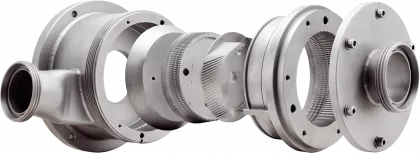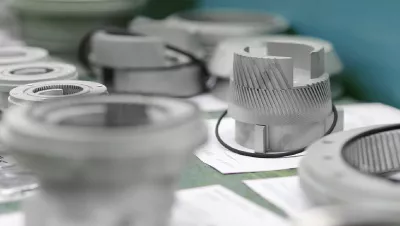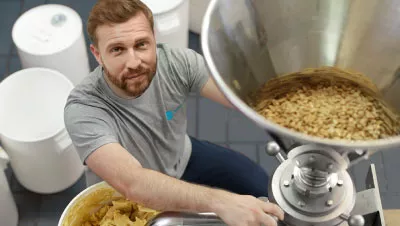Machines and industrial equipment for the production of vegan cream
Machines and industrial equipment for the production of vegan cream.
Probst & Class develops and manufactures both individual machines and equipment for the production of vegan cream.
Every end product needs its own bespoke machine configuration.
Our strategy for perfect customisation: puclab.
Research project with the Technical University of Berlin (TU Berlin) and the Karlsruhe Institute of Technology (KIT)
Against the backdrop of growing consumer health awareness and a fundamental shift towards increased consumption of plant-based foods, the food industry is showing great interest in the development of products in which animal fats and proteins are replaced by plant-based alternatives, with a particular focus on vegan milk and cream alternatives.
In cooperation with two leading German universities, Probst & Class is researching the importance of the protein and lipid phase in the development of vegan cream.
Download further information on the research project (in German).
Our laboratory-scale colloid mill (PUC 60, Type O design) was employed for this research project
Specific interim results of the research project (status 2025)
The results achieved in each work package (WP) are summarised below.
The complete report can be downloaded here as a PDF.
WP 1 – Protein recovery & characterisation
- Pea protein
- 300 g globulin-rich fraction (~ 90 % protein) produced
- Critical interfacial concentration (CIC) ≈ 0.01 wt %
- pH-dependent solubility determined (optimal at pH 7)
- Proteins largely native (denaturation peak ≈ 75 °C)
- Milestone 1 achieved
- Oat protein
- Hexane defatting protocol established; residual fat ↓ to ~ 1.6 %
- Purification scheduled for completion in Feb 2025
WP 2 – Protein / phospholipid interfaces
- Lipids tested: PC 18:0/18:1, PE 18:0/18:1 and six lecithin blends
- Unsaturated PLs exhibit lower CMC values than saturated counterparts
- Stable coexistence window: protein 0.01 % + PL ≤ 0.005 % (saturated) or ≤ 0.0005 % (unsaturated)
- Emulsions (Ø 5–10 µm): saturated PCs stabilise droplets, unsaturated PCs promote rapid droplet growth
- PC 18:0 and PC 18:1 selected for subsequent WPs – Milestone 2 achieved
WP 3 – Fat-phase screening
- Oleogels based on sunflower, rice-bran, carnauba and candelilla wax
- Gel hardness increases with wax load; all systems brittle
- Candelilla wax shows the most favourable melt/softening profile
- Ethyl-cellulose oleogels discarded (≥ 20 % EC, 160 °C required)
- TAG concepts: diverse palm and shea fractions characterised
- Selected for Phase II: 15 representative systems – focus on sunflower- and candelilla-wax oleogels plus fully hydrogenated palm-kernel oil – Milestone 3 achieved
WP 4 – Thermo-mechanical interfacial stability
- High-pressure homogenisation (200/50 bar, 50 °C) scarcely affects pea protein
- Interfacial rheology
- Pure protein film: G′ > G″ up to ~ 100 % strain
- With PC 18:0: G′ increases → additional elastic contribution
- With PC 18:1: G′ decreases → weakened protein–protein interactions
- Films stable during a 12 h period – Milestone 4 achieved
WP 5 – Process parameters (cooling rate & shear)
- Rapid (20 K min⁻¹) vs. slow (5 K min⁻¹) cooling: cooling profile less significant than wax type
- Slow cooling ↑ droplet deformation; palm-stearin forms spiky crystals → higher coalescence risk
- Homogenisation (5 cycles, 50 bar) yields d₅₀ ≈ 1–4 µm – WP 5 on schedule
WP 6 – Droplet size vs. structuring
- 1.2 µm (milk-like) vs. 3.6 µm (cream-like): tribology virtually identical; droplet size has little impact on texture
- Friction correlates with solid-fat content, not with droplet size or protein type
- Data collection complete; storage and rocking tests ongoing
WP 7 ff. – Model applications & upscaling
- Experimental designs for barista milk, cooking cream and whipping cream defined; implementation from Feb 2025
- Pilot-type upscaling of two formulations with industry partners from Q3 / 2025
- Practical guideline for SME transfer in preparation (planned publication Apr 2026)
Cross-project key findings
- Interfacial co-stabilisation demands tight protein/PL ratios; saturated PCs increase film elasticity, while unsaturated PCs may destabilise the film.
- Wax oleogels deliver firm yet brittle fat structures; candelilla wax offers the best melt–brittleness balance.
- Cooling profile influences droplet morphology more than gel hardness – slow cooling heightens coalescence risk.
- Tribology as a sensory proxy: friction is primarily governed by solid-fat content and fat modulus, not by droplet size or protein source.
- All milestones up to MS 4 have been met; the project is progressing according to plan.
Next steps (2025)
- Complete oat-protein purification & additional PL coexistence tests
- Long-term storage studies on emulsion and texture stability
- Pilot-scale production and sensory validation of the two lead formulations
- Draft practitioner guides on ingredient selection, process windows and test methods for SME transfer (Q1 / 2026)
Process steps in the production of vegan cream with our colloid mills
Our machines are used in the following processes in the production of plant-based cream alternatives:
Crushing and grinding: Nuts and seeds are crushed and finely ground in the colloid mill, resulting in a creamy homogeneous mass.
Emulsifying: In the colloid mill, the fatty components are emulsified with the aqueous components to achieve a stable and uniform mixture. This prevents the oil and water phases from settling and separating later on.
Mixing in thickening agents: The plant-based thickening agents listed are incorporated into the mixture using our colloid mills to achieve the desired viscosity. The colloid mill ensures that these additives are evenly distributed.
Homogenising: Using our colloid mills, the mixture is homogenised throughout. The resulting end product is very similar to conventional cream in texture, creaminess and flavour and can completely replace cream made from animal milk for most cooking applications.
Machine types used
Colloid mills from Probst & Class can basically be used to process all ingredients that have a minimal moisture content. As plant-based cream alternatives always have a high water content, colloid mills are generally well suited for this.
The infinitely adjustable grinding set and easy-to-clean grinding mechanism ensure flexible use at all times. A wide range of gearing geometries also makes it possible to cater for ingredient-specific conditions and thus achieve the best possible results.
Our perforated disc mills also offer the option of precomminution of coarser products and, in combination with our colloid mills, greater degrees of fineness. We can achieve end product fineness of less than 10 micrometres.
We also offer in-line deaeration systems for the extraction of air or other gases. This procedure is particularly appropriate before packaging in order to achieve a clean environment and preserve the properties of the plant milk.
Production process
Processing and production can be carried out with Probst & Class mills and systems in a batch process or continuous inline process, depending on the requirements. We are happy to advise you as to the advantages and disadvantages of the processes as well as system integration. Please send us an enquiry for our puclab service.
Probst & Class as a supplier to the food industry
Probst & Class mills have been used in state-of-the-art food processing for 80 years. With a PUC, both small and large companies produce vegan cream and milk alternatives of top quality consistently.
The high production quality of PUC machines usually guarantees a service life of several decades. The supply of spare and wear parts, even for very early models, guarantees a secure investment and low total cost of ownership.

Find your ideal machine, reliably and quickly
In the almost 100-year history of Probst & Class, there is one constant: Practically every end product needs its own individual machine configuration!
Two special features of Probst & Class guarantee the highest satisfaction and loyalty of our customers: The simple convertibility of our machines and our approach to customisation.
What has been part of our success for decades is now a strategy. We call this strategy puclab.
puclab is more than a development lab
- System consulting: Holistic concepts for the construction of new systems and the conversion of systems to other products
- Outsourced R&D for our customers' wet grinding, mixing and degassing processes
- Preliminary trials to help decide on the optimal process
- Further development of processes in case of changed specifications
- Application database with test set-ups, test results and videos

puclab – Pilot
Make an appointment for preliminary tests in our pilot plant.
We give you and your product as much time as needed. Together with your technicians/engineers, we determine the best possible configuration for your new PUC machine in our test lab and plan its integration into your process.

puclab – On-Site
Test a PUC mill in your plant or laboratory.
Talk to our technical support to define the requirements for your process and product. We then provide you with a suitable machine, free of charge, and offer support for your in-house trials.

puclab – Remote
Send us your raw materials for testing.
Based on your specifications and materials, we determine the best machine configuration for your end product in our technical centre. Using different grinder sets and settings, we can calculate within a few hours how your new PUC mill needs to be configured, without charge.
Contact our sales department
Still unsure about the best way to proceed?
Simply contact the sales team. We are happy to help you.
- Bitumen Emulsifier: Machines for the Production of Bitumen Emulsion
- Colloid Mills - Try before you buy
- Machines and Colloid Mills for Fungicide Production
- Machines and Colloid Mills for Herbicide Production
- Machines and Colloid Mills for Insecticide Production
- Production of Emulsion Paints with Colloid Mills
- Industrial peanut butter making machine and equipment
- Machines and Colloid Mills for Fertiliser Processing
- Machines and Colloid Mills for Processing Plant Protection Products
- Machines and components for the production of animal feed
- Machines for grease processing and grease post-treatment
- Machines for processing and post-treatment of industrial lubricating oils
- Machines for Processing Soybeans
- Machines for the commercial production of facial cream
- Machines for the Industrial Production of Mayonnaise
- Machines for the processing of collagen
- Machines for the production of baby food
- Machines for the production of hand cream
- Machines for the production of jam
- Machines for the production of meat substitutes
- Machines for the production of plant-based cream alternatives
- Machines for the production of plant-based milk alternatives
- Nut mills and machines for nut grinding
- Peanut Processing Machines and Equipment
- Processing of Paints and Coatings with Colloid Mills
- Processing of Printing Inks with Colloid Mills
- Processing of Digital Printing Inks with Colloid Mills
